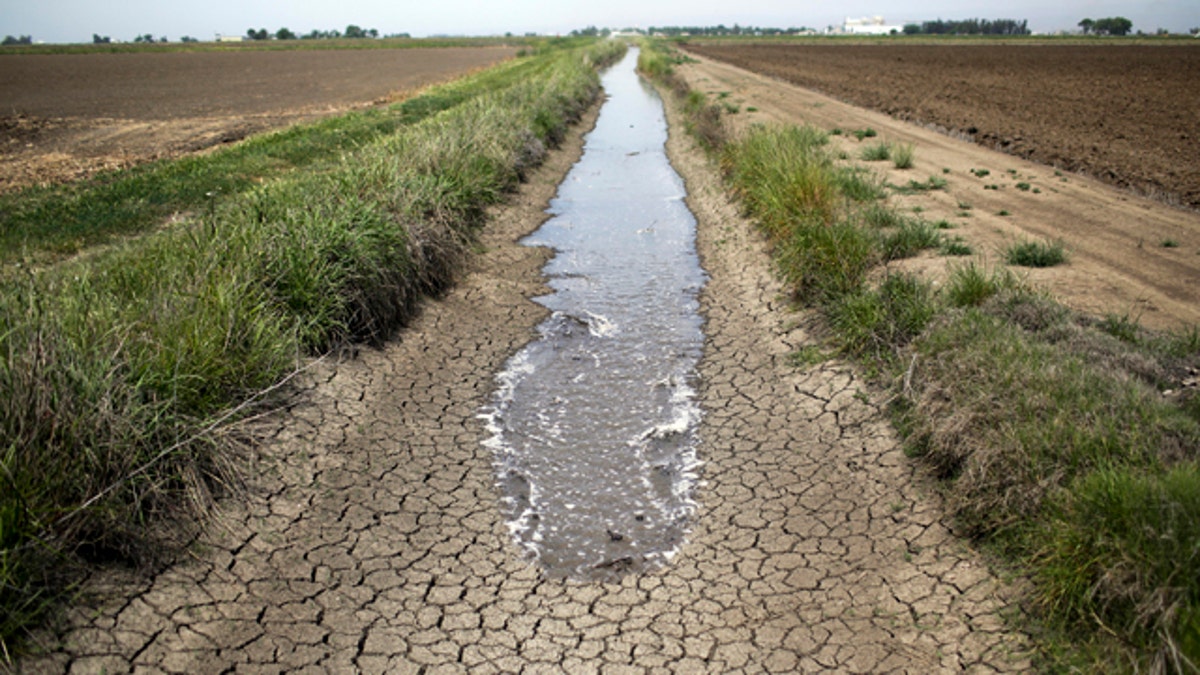
FILE - This May 1, 2014, file photo shows irrigation water running along a dried-up ditch between rice farms in Richvale, Calif. (AP Photo/Jae C. Hong, File)
SACRAMENTO – Driven to action by the state's historic drought, California lawmakers on Wednesday voted to place a $7.5 billion water plan before voters in November.
The measure marks the largest investment in decades in the state's water infrastructure and is designed to build reservoirs, clean up contaminated groundwater and promote water-saving technologies.
It replaces an existing water bond that was approved by a previous Legislature but was widely considered too costly and too bloated with pork-barrel projects to win favor with voters.
After weeks of difficult negotiations, the ballot measure sailed through both houses of the Legislature: 77-2 in the Assembly and 37-0 in the Senate. Republican Tim Donnelly of Twin Peaks and Democrat Wesley Chesbro of Arcata cast the dissenting votes in the Assembly.
Gov. Jerry Brown signed the legislation, AB1471, shortly after the Legislature acted. Citing the overwhelming bipartisan support, the Democratic governor said he probably had never seen Democrats and Republicans so united in his lifetime.
"It's about water, it's about our future, it's about Californians coming together," Brown said.
The evening votes in the Assembly and Senate came after the Democratic governor and lawmakers from both parties were finally able to clear their main hurdle, a disagreement about how much money should be spent on new reservoirs and other storage projects.
A state with a population that exceeds 38 million and an agricultural industry that feeds the nation has been struggling to meet the increasing demands for water after three dry winters.
The push to revamp the 2009 ballot measure, which was $11.1 billion and had been delayed from statewide votes twice, gained momentum as the worst drought in a generation intensified throughout the state. It has forced farmers to fallow fields, led to double-digit unemployment in many rural areas, turned large expanses of reservoirs into mud flats and prompted local governments to mandate water-use restrictions and impose fines for water waste.
Senate President Pro Tem Darrell Steinberg, D-Sacramento, said water was something many Californians had previously taken for granted.
"The need is so great in California," he said, referring to the wide margin of support the spending measure enjoyed in the Legislature. "The time is now."
The relatively swift and overwhelming votes for passage in both houses of the Legislature were in contrast to the weeks of difficult negotiations to replace the existing and more costly water bond that already was on the November ballot.
Brown wanted a much smaller bond to attract voters and minimize state debt, while many Democratic lawmakers fought against money for reservoirs and sought strong environmental protections for the Sacramento-San Joaquin River Delta.
The proposal approved Wednesday includes $2.7 billion dedicated to storage projects, which likely would include a new reservoir in what is now a bucolic agricultural valley in Colusa County north of Sacramento and another in the Sierra Nevada northeast of Fresno.
That amount is more than Democrats and the governor had proposed for new reservoirs but less than the $3 billion included in the old ballot measure, which was approved by a previous Legislature in 2009.
The breakthrough on water storage was hailed by Republican lawmakers, who saw it as a top priority. Democratic lawmakers who represent agricultural areas in the Central Valley also pushed for the reservoir funding.
"This now offers us an opportunity to guarantee the future," said Sen. Jim Nielsen, a Republican who represents a largely agricultural region in Northern California that will be home to one of the proposed reservoirs. "This is not about us and not about the next election; it's about our grandchildren."
Numerous agricultural, environmental and business groups quickly endorsed the legislative compromise. The plan includes $7.1 billion in new borrowing and $425 million from previous bonds that would be redirected to the updated water priorities. Redirecting that money requires voter approval.
Provisions in the latest bond proposal involving water recycling and cleanup of contaminated groundwater could increase the availability of water during future droughts. The bond also includes other water projects not directly related to supply, such as watershed improvements and flood management.
Democrats needed Republican support in the Senate but not in the Assembly, where they hold a supermajority. Even so, the governor has said bipartisan support for the bond measure is crucial to show voters that it has wide support.
Assembly Speaker Toni Atkins, D-San Diego, said lawmakers can show a united front and make a strong case to voters that the water plan is worth supporting.
"People should feel a sense of comfort that when you got the boat rowing in the right direction that we are going to be OK, we are going to succeed," she said. "I think we are all going to become cheerleaders for doing the right thing."
Wednesday's scheduled vote was timed to the secretary of state's deadline for printing voter pamphlets, which lawmakers had earlier pushed back by two days.




